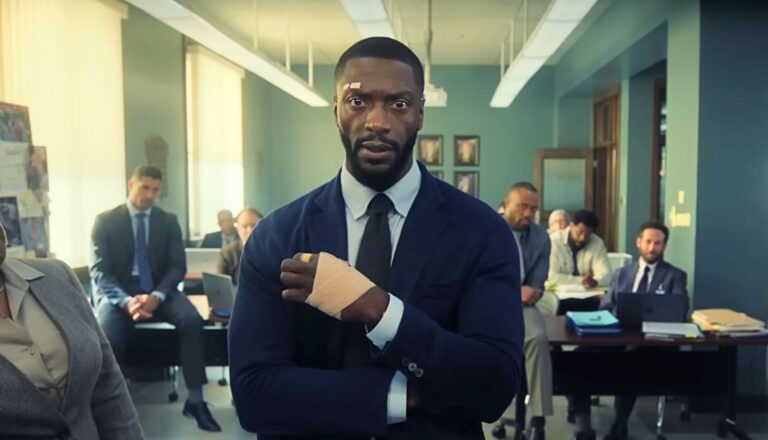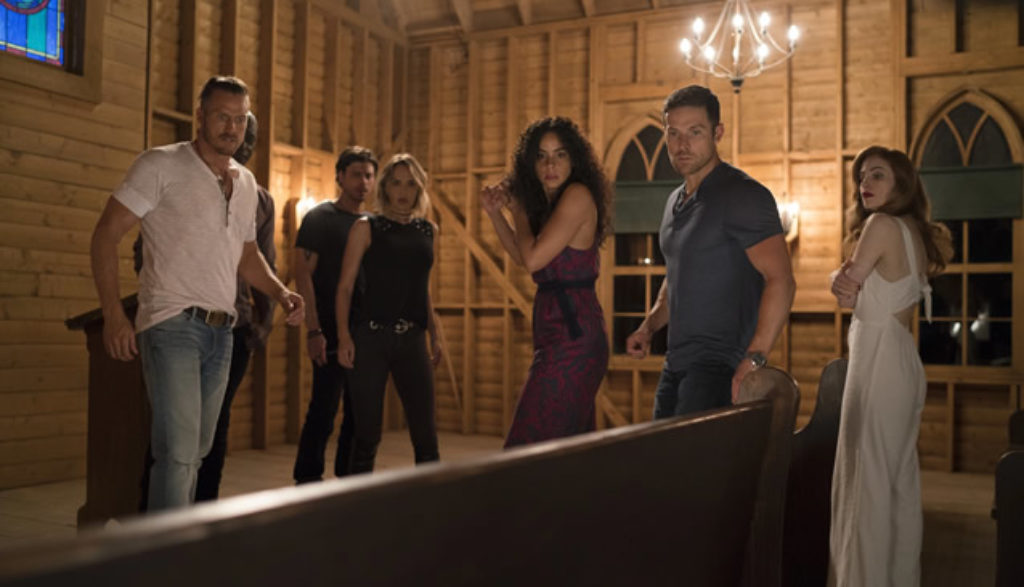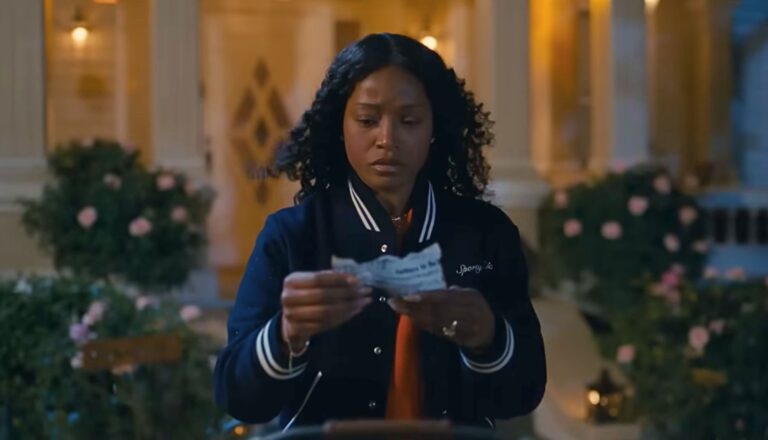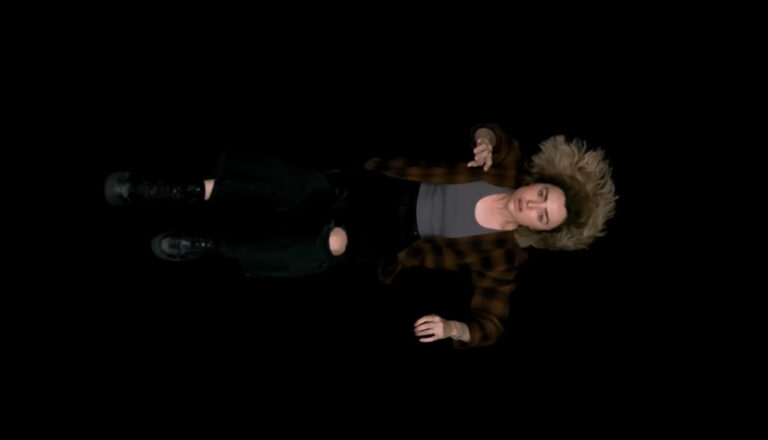
Cross
Though it’s compelling, the content concerns in Prime Video’s ‘Cross’ might be enough to cross it off your watch list.

Every small town harbors its share of secrets. But Midnight has more than most.
Walk into the local pawn shop, and you might visit with a mysterious assassin. (Her undead vampire lover would likely be taking a nap during business hours.) Midnight’s magic shop is owned, naturally, by a witch. The local pastor’s a weretiger. Grab a candy bar at the Gas N’ Go, and you just might stand in line behind a gay fallen angel.
Yep, in Midnight, normal mortals are the oddballs. It’s the sort of place where the local café never serves garlic bread; potholes could literally lead to hell; and, when Halloween comes around, all the local kids dress up as accountants.
Manfred Bernardo is one of Midnight’s more grounded residents, being merely a spirit-channeling psychic who’s regularly visited by his dead grandmother. (She was a grifter when she was alive, by the way, which makes her one shady shade.) Manfred came to Midnight to escape a rather treacherous past—a past which, unfortunately, has followed him right into town.
But despite the fact that his life seems perpetually in danger and his home is sometimes possessed by seriously evil spirits, things are actually looking up for the guy. Midnight’s just his kind of town.
I understand why: Midnight might be home to the most impressive Neighborhood Watch program in the country. Whenever anyone gets into trouble—supernatural or otherwise—friends and neighbors whisk into action to save the day and stop/kill/eat/disintegrate any evildoers who might mean trouble. They’re good people, these folks—even if some of them aren’t technically people at all.
Sure, no one here is perfect: You don’t want to eat lunch with the Rev. Emilio Sheehan during his weretiger time of the month—or, at least, before his curse was cured. But who doesn’t have their bad days, right?
But despite all its well-meaning, ill-begotten residents, the town itself deals with a lot more angst than your typical Texas township. Evildoers come in to make trouble. Occasional curses and possessions plague its residents. And, of course, you always have to worry about the pit of literal hell lurking under its very foundations.
NBC’s Midnight, Texas, is strictly a laughable, if horrific, primetime diversion. But while it doesn’t seek to inspire to a boatload of think pieces, it still has some things to say. And it’s not all bad.
The citizens of Midnight—supernatural or not—generally want to do the right thing, sometimes even at great personal cost. They help each other. The show also insists good and evil are real forces in this world of ours, and that God is quite real, too.
‘Course, Midnight’s God is very different, and very much diminished, from the one most of us worship. A weretiger Reverend may have held court in church (he disappeared, perhaps just temporarily, in Season 2), but a goddess-worshipping witch sells magical wares just up the street. Joe Strong, meanwhile, is presented as one of the show’s most moral characters. And given that he’s an angel, that makes sense. But he’s also a fallen one, and in a gay marriage to a half-demon—succinctly divorcing traditional Christian teaching from the show’s understanding of what goodness really is.
Indeed, despite a few small nods to a Christian understanding of the Almighty, the show’s ethos is more Wiccan than anything else—an ethos that goes well beyond its chummy embrace of occultic elements.
“An harm it none, do what you will,” says a key Wiccan teaching. And the folks of Midnight embody that mindset: They’re pretty accepting of everyone as long as they don’t hurt anyone else. (Even that stance seems a bit malleable, depending on who they hurt and why.)
Naturally, no one blinks at the various sexual relationships we hear about in this Texas town. Meanwhile, the deaths of dozens of outsiders—be they vampires or very mortal bikers—isn’t considered worthy of a moment’s thought, much less a moment of silence. While those seemingly superficial content concerns take a back seat to the show’s hinky, mix-and-match worldview problems, there are still plenty of those superficial concerns to give parents pause on their own.
When I was a little kid, I always thought it’d be awesome to stay up ’til midnight. But given a choice between seeing this Midnight and going to bed early … well, see you in the morning, everybody.
(Editor’s Note: Plugged In is rarely able to watch every episode of a given series for review. As such, there’s always a chance that you might see a problem that we didn’t. If you notice content that you feel should be included in our review, send us an email at letters@pluggedin.com, or contact us via Facebook or Instagram, and be sure to let us know the episode number, title and season so that we can check it out.)
A mysterious pregnant woman comes to town looking for the Rev, but dies giving birth to a remarkable little girl named Mary—a weretiger. The town later discovers that her dearly-departed mother was running from (are you sitting down for this?) a “supernatural fight ring” in which creatures enslaved by Mary’s grandma would fight to the death. Meanwhile, Fiji tries to get her lover, Bobo, to stop loving her due to a curse on her family (wherein anyone who falls in love with her will surely die). She tries to break up with him, and when that doesn’t work, she uses magic to make Bobo forget her. And when that, too, fails, she apparently turns the guy into a dog. (Temporarily, she says.)
Mary’s mother’s childbirth death is pretty horrific: Mary, whop’s perhaps getting hungry in there, tears open the womb and bursts from her mom’s body, killing her instantly and spraying blood across the Rev’s old church. (Townspeople ogle at the really horrific-looking corpse.) When two ruffians come to town looking to bring Mary back to the fight club, Mary (who, by virtue of her weretiger blood, is a young teen by now) promptly kills them both (off-camera, but we see their bloodied bodies in the aftermath, as well as Mary in weretiger form covered in blood).
Lemuel, Midnight’s resident vampire, fights in the fight ring. We see people thrown about in it. Eventually, Lem either renders his opponents unconscious or kills them ( though it’s unclear whether his finishing moves are terminal or not). The woman who owns the fight ring shocks participants repeatedly with electric collars. But when those restraining collars get turned off, the woman’s enslaved charges turn on her. (The camera doesn’t linger, but we assume it doesn’t end well.)
Manfred talks with ghosts. Fiji casts spells. Her cat, as usual, chats accommodatingly. In flashback, we see Fiji and Bobo make out (one shot shows them apparently naked, though we only see them from the shoulders up). Manfred and new resident Patience Lucero, who’s married to Kai Lucero, kiss and apparently have sex in Manfred’s house. (The door shuts on their passionate make-out session before we see anything explicit.) He and Patience also engage in tequila shots. Patience also manipulates men through suggestive outfits and suggestive flirtation. We hear from Olivia (Lemuel’s lover and a one-time assassin) how her stepmother “pimped” her out as a child to support her drug habit. Manfred drinks whiskey alone.
We hear characters say “a–,” “b–ch,” “d–n,” “h—” and “p-ss.” God’s name is used inappropriately once.
Manfred realizes he can’t run from the dastardly creep who’s been following him for so long, so he decides to stand up and deal with the problem—a problem he knows that he helped create a long time ago. Meanwhile, the Sons of Lucifer biker gang kidnaps Fiji, Midnight’s resident witch. It’s up to Bobo, Fiji’s fairly normal boyfriend, to rescue her.
Lemuel, a vampire, volunteers to help Bobo with his rescue operation. He kills several bikers en route: We see him bite the neck of one, and corpses of others are eventually shown strewn across the ground. But Lem suffers a great many gunshot wounds, too. They’re non-lethal (given that he’s already dead), but the wounds are grotesque and in need of bandages nonetheless. (We also see Lem shirtless as his assassin lover, Olivia, bandages him up.) Bobo also kills an assailant, stabbing the head biker with the man’s own knife. It’s revealed that Bobo’s whole family was embroiled in the white supremacy movement, and that he watched his father bomb a church in Atlanta when he was 17.
Manfred lets fall one of his own secrets: Years ago, he jilted a woman at the altar, and the woman committed suicide shortly thereafter. The woman’s father has been chasing Manfred ever since—and carting his daughter’s decayed corpse along, too. Manfred tries to make amends, including his attempt to call the daughter’s spirit up. That entity possesses Manfred briefly—long enough for her to nearly choke her father to death (using Manfred’s hands). The spirit departs. But the woman’s father, in his guilt, commits a supernatural kind of suicide: He conjures up black magic, shatters windows and telekinetically stabs himself with dozens of shards, thus killing himself.
Fiji utters “my goddess!” as an exclamation. Her cat talks. As she incants a spell, Bobo asks her if she’s praying. Manfred’s dead grandmother stops by for a visit. Couples kiss. Creek, Manfred’s girlfriend, wears a dress that reveals some thigh and cleavage.
Bobo gets severely beaten by motorcycle gang members, leaving him with a bloodied face. He fights with a gang member later on, and the two trade punches and wrestle. A cache of weapons explodes. A pipe bomb sets a building on fire. A character gets forcibly drugged despite protestation (“Like morphine, but a hundred times stronger,” someone explains). Characters say “b–ch” and “h—,” and they use God’s name inappropriately three times. An s-word is partially uttered.

Paul Asay has been part of the Plugged In staff since 2007, watching and reviewing roughly 15 quintillion movies and television shows. He’s written for a number of other publications, too, including Time, The Washington Post and Christianity Today. The author of several books, Paul loves to find spirituality in unexpected places, including popular entertainment, and he loves all things superhero. His vices include James Bond films, Mountain Dew and terrible B-grade movies. He’s married, has two children and a neurotic dog, runs marathons on occasion and hopes to someday own his own tuxedo. Feel free to follow him on Twitter @AsayPaul.

Though it’s compelling, the content concerns in Prime Video’s ‘Cross’ might be enough to cross it off your watch list.

‘The ‘Burbs’ is Peacock’s attempt to adapt the 1989 movie of the same name. But a fresh coat of paint doesn’t hide the content issues.

Don’t be fooled by the show’s teenage characters. Parents would be advised not to let their own teens be haunted by its content.

‘Drops of God’ focuses on a wine-centric competition, and it comes with notes of sexual content and some crude language, too.